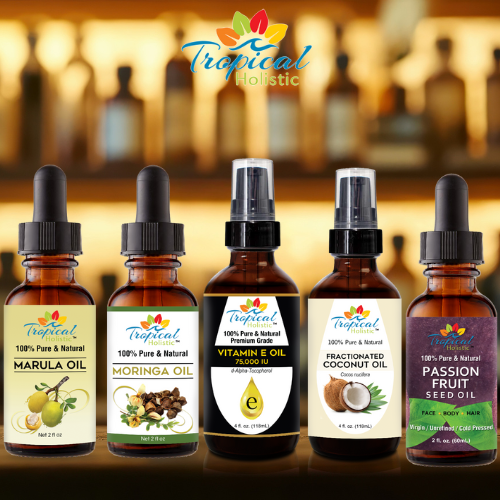At Tropical Holistic, we pride ourselves on offering a wide selection of natural oils that are perfect for skincare, hair care, and wellness. Whether you're using our Jamaican Black Castor Oil to strengthen your hair or Rosehip Oil to nourish your skin, one question often arises: "How long will my oils last?" In this blog post, we’ll explore the shelf life of various oils and provide tips on how to store them properly so you can make the most of every drop.
Why Does Shelf Life Matter?
Natural oils, while rich in nutrients and beneficial compounds, can lose their potency over time. Exposure to light, air, and heat can cause oils to go rancid or lose their effectiveness. Understanding the shelf life of your oils ensures you're using them at their peak, allowing you to get the most out of their benefits.
What Is the Average Shelf Life of Oils?
Here’s a quick guide to the average shelf life of some of our most popular oils:
- Olive Oil – Up to 2 years
- Rosehip Oil – 6 to 12 months
- Jamaican Black Castor Oil – 2 to 3 years
- Pomegranate Seed Oil – 1 year
- Pumpkin Seed Oil – 1 year
- Black Seed Oil – 1 to 2 years
- Grapeseed Oil – 6 months to 1 year
- Squalane Oil – 2 years or more
- Rosemary Oil – 1 to 2 years
- Peppermint Oil – 2 years
- Clary Sage – 2 years
- Frankincense – 2 years or more
- Shea Butter – 1 to 2 years
- Apricot Seed Oil – 1 year
- Moringa Oil – Up to 2 years
- Vitamin E Oil – 1 to 2 years
- Glycerin – Up to 5 years
- Rosewater – 6 months to 1 year
- Sea Buckthorn Oil – 1 year
How to Extend the Life of Your Oils
Want to keep your oils fresh for as long as possible? Here are a few storage tips:
-
Store in a Cool, Dark Place: Exposure to heat and light can speed up the oxidation process, causing oils to go rancid. Store your oils in a cool cupboard or drawer, away from direct sunlight.
-
Keep the Cap Tightly Sealed: Oxygen can degrade oils over time. Make sure to tightly close the cap after each use to limit the oil’s exposure to air.
-
Consider Refrigeration: Some oils, like rosehip and black seed oil, benefit from being stored in the fridge to preserve their shelf life. However, not all oils require refrigeration, so check each product's recommendations.
-
Use Clean, Dry Hands or Tools: When using your oils, ensure your hands or tools are clean and dry to prevent contamination that could lead to spoilage.
How to Tell If Your Oil Has Expired
It’s important to trust your senses when it comes to oils. If an oil smells off or has developed an unusual, rancid odor, it’s likely no longer good to use. Changes in texture or appearance, such as cloudiness or separation, can also indicate that an oil has reached the end of its shelf life.
Conclusion
At Tropical Holistic, we ensure that all of our oils are fresh, high-quality, and free from harmful additives. By understanding and respecting the shelf life of these natural products, you can maximize their benefits and enjoy their full potency. Need help finding the right oil for your skincare or wellness routine? Check out our collection here and feel free to reach out with any questions.

